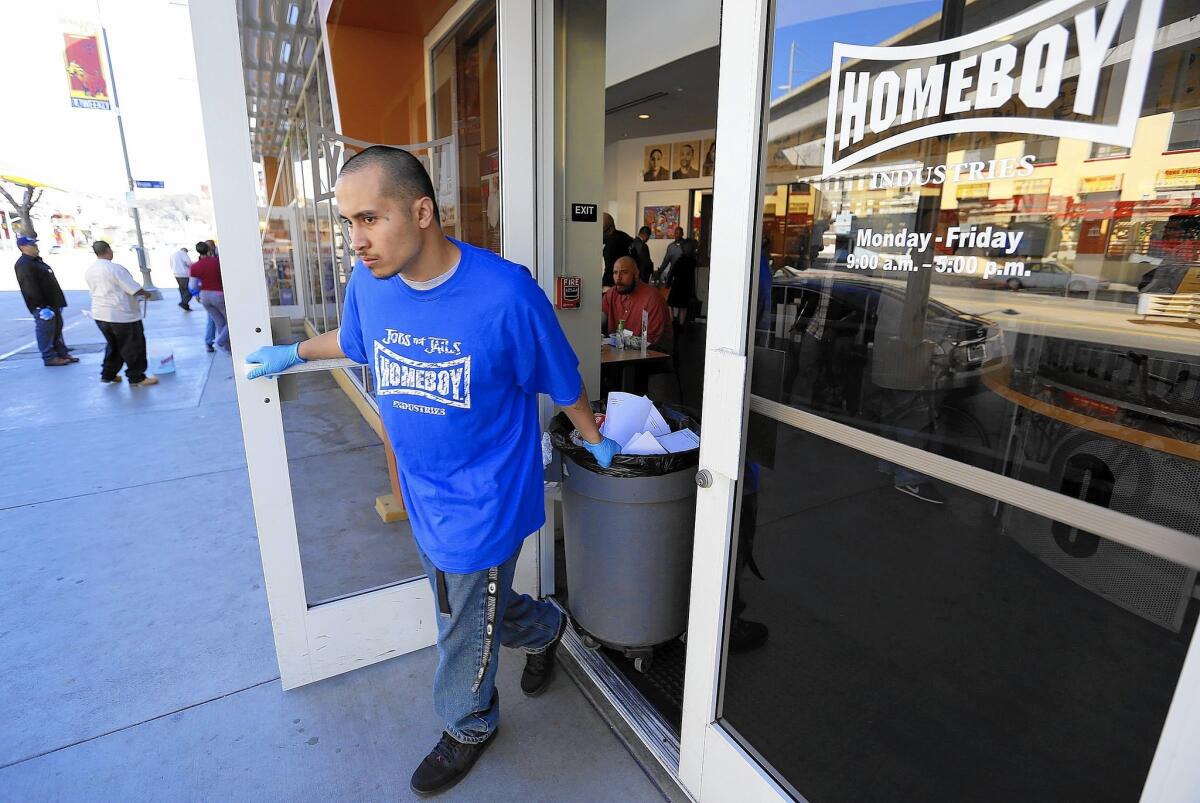L.A. nonprofits aiding hard-to-employ may get temporary wage hike exemption

- Share via
Nonprofits that help former gang members, the homeless and other hard-to-employ Angelenos get back into the workforce could get a temporary exemption from Los Angeles’ minimum wage hike, a move intended to ensure they won’t cut back on the number of disadvantaged clients they serve.
Last month, L.A. lawmakers voted to gradually hike the citywide minimum wage to $15 hourly by 2020. But City Council members pushed off several sensitive decisions, saying they would address those issues before the first citywide increase takes effect next year.
Among the unresolved questions was how the pay requirements should apply to nonprofit groups that help train workers.
Under the proposed exemption approved by a City Council committee Tuesday, nonprofit programs such as Homeboy Industries, which assists former gang members and ex-inmates with jobs and training, would be exempt from the pay requirements for up to a year and a half.
Each worker in such training programs could be paid less than the L.A. city requirement for the first 18 months of their employment through the nonprofit. Council member Gil Cedillo, who championed the proposal, said such programs provide more than just wages, investing in their employees with training, case management, counseling and an array of other services.
Groups such as Chrysalis, which provides jobs to the formerly homeless and otherwise disadvantaged, the L.A. Conservation Corps and Homeboy Industries have argued that they will have to reduce the number of people they serve if they do not get a temporary exemption for workers in their training programs. Homeboy director of employment services Jose Osuna estimated the organization would be forced to eliminate 60 of its 170 trainee positions by the time the minimum wage hit $15.
“At Homeboy Industries, it has never been about the pay,” Mariana Ruiz told lawmakers at Tuesday’s hearing. She credited the program with helping her improve her life after years of drug use and crime, hiring her when nobody else would and assisting her in getting her driver’s license and GED.
“I walked into Homeboy Industries broken and hopeless but with the desire to take my life back.… It helped me to establish a life beyond my imagination,” Ruiz said.
The Los Angeles Area Chamber of Commerce and the Central City Assn., which advocates for downtown businesses, back the proposed exemption. But the Los Angeles County Federation of Labor has argued against loosening the rules for nonprofits such as Homeboy Industries. Councilman Curren Price, one of the lawmakers who pushed to raise the minimum wage, said he was uneasy with the idea.
“Philosophically, I’ve not been comfortable saying to transitional workers that because they’ve faced challenges in their lives in the past, they deserve to get paid less than every other worker in the city,” Price said.
However, Price said Tuesday he was “moved by the outpouring of support that workers themselves have given this proposal.”
“And I want to ensure that we don’t limit the power these organizations have to impact more lives,” Price added. He said he would support the proposal provided that the city strictly defines what qualifies a nonprofit to prevent abuse of the exemption.
The Economic Development Committee asked city lawyers to draft legal language that would spell out eligibility requirements for the exemption. The matter now heads to the entire City Council for consideration.
A number of other questions remain for L.A. lawmakers before the minimum wage increases begin, including whether to require employers to offer more paid time off to their workers, whether to establish a waiver allowing unionized companies to pay a lower wage if their workers agree and whether to restrict restaurants’ use of surcharges to offset added costs.
Under city rules already approved by lawmakers, the citywide minimum wage will increase to $10.50 in July 2016 and continue to climb gradually until it hits $15 hourly for large businesses in 2020. Small businesses and some nonprofits will be granted an extra year to phase in the wage hikes. Future increases will be tied to the consumer price index.
Follow @latimesemily for what’s happening at Los Angeles City Hall.
Times staff writer David Zahniser contributed to this report.
More to Read
Sign up for Essential California
The most important California stories and recommendations in your inbox every morning.
You may occasionally receive promotional content from the Los Angeles Times.














![Vista, California-Apri 2, 2025-Hours after undergoing dental surgery a 9-year-old girl was found unresponsive in her home, officials are investigating what caused her death. On March 18, Silvanna Moreno was placed under anesthesia for a dental surgery at Dreamtime Dentistry, a dental facility that "strive[s] to be the premier office for sedation dentistry in Vitsa, CA. (Google Maps)](https://ca-times.brightspotcdn.com/dims4/default/07a58b2/2147483647/strip/true/crop/2016x1344+29+0/resize/840x560!/quality/75/?url=https%3A%2F%2Fcalifornia-times-brightspot.s3.amazonaws.com%2F78%2Ffd%2F9bbf9b62489fa209f9c67df2e472%2Fla-me-dreamtime-dentist-01.jpg)